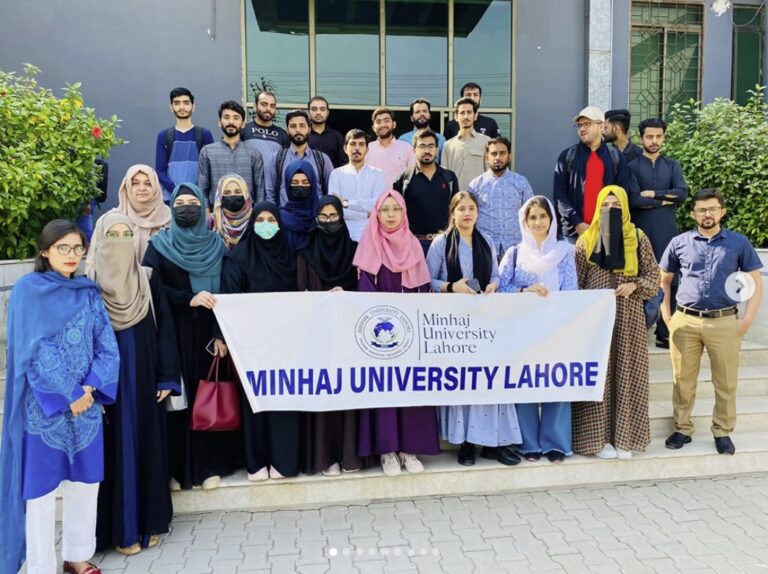Minhaj University Research Centers
Minhaj University Research Centers: Where Innovation Takes Place
Minhaj University Lahore (MUL) stands as a beacon of intellectual growth and innovation, nurturing research scholars and providing them with a robust platform to tackle society’s pressing challenges. The university has carved a niche for itself by fostering groundbreaking research, offering state-of-the-art resources, and supporting researchers at every stage, from ideation to publication.
With 15 diverse research centers, Minhaj University Lahore aims to revolutionize the academic and practical realms by conducting seminars, workshops, and training sessions. This article explores the significance and offerings of these centers and their contributions to global research.
The Importance of Research Centers in Modern Academia
Research centers play a vital role in shaping a nation’s intellectual and economic landscape. At Minhaj University Lahore, the research centers are not just institutions; they are vibrant hubs for knowledge exchange, skill development, and innovation. These centers:
- Foster original research.
- Provide training and development opportunities.
- Serve as platforms for interdisciplinary collaboration.
- Support societal progress through innovative solutions.
Overview of Minhaj University’s Research and Training Centers
Minhaj University Lahore hosts 15 specialized research centers designed to cater to various disciplines, including Islamic studies, economics, language, arts, and scientific advancements.
1. Center for Research and Development
This center focuses on fostering innovation and development across multiple disciplines. It aims to produce high-impact research by:
- Encouraging interdisciplinary studies.
- Hosting seminars to share research findings.
- Supporting innovative research projects.
2. Center of Islamic Arts and Crafts
Reviving the beauty of Islamic heritage, this center delves into the intricate world of Islamic arts and crafts. Its primary activities include:
- Researching traditional Islamic art forms.
- Organizing exhibitions to showcase Islamic craftsmanship.
- Training students in calligraphy and other Islamic arts.
3. Centre for Economic Planning and Development (CEPD)
This center addresses economic challenges through rigorous research and innovative solutions. Key contributions include:
- Research on sustainable economic development.
- Policy recommendations to tackle economic crises.
- Workshops on financial planning and management.
4. Centre for Halal Awareness, Research, and Training
As the global demand for halal products grows, this center pioneers research and training in halal compliance. Its initiatives include:
- Halal certification training programs.
- Research on halal food processing techniques.
- Awareness campaigns about halal standards.
5. Centre of Research and Innovation in Maritime Affairs
Pakistan’s maritime sector holds immense potential, and this center explores ways to maximize it. Activities include:
- Research on maritime trade and security.
- Collaboration with international maritime organizations.
- Training programs in maritime logistics.
Pioneering Research in Language, Literature, and Culture
6. Corpus Research Centre
This center is a haven for linguistic research, focusing on corpus linguistics. It contributes by:
- Developing corpora for local languages.
- Facilitating research in computational linguistics.
- Offering workshops on language analysis tools.
7. Directorate of Open and Distance Learning (DODL)
Catering to the needs of remote learners, this directorate ensures high-quality education through:
- Development of e-learning materials.
- Online workshops and virtual seminars.
- Research on effective distance learning methodologies.
8. English Language Center
Promoting proficiency in English, this center helps students excel academically and professionally. Its initiatives include:
- English language proficiency courses.
- Research on modern teaching methodologies.
- Certification programs for teachers.
Promoting Islamic Heritage and Spirituality
9. Farid-e-Millat Research Institute
Dedicated to Islamic research, this institute explores various aspects of the Quran and Sunnah. Contributions include:
- Translation and interpretation of Islamic texts.
- Organizing Islamic research conferences.
- Publishing Islamic research journals.
10. Hassan-bin-Thabit Center for Research in Na’t Literature
Na’t literature holds a special place in Islamic culture. This center focuses on:
- Researching the evolution of Na’t literature.
- Organizing Na’t writing competitions.
- Publishing scholarly works on Na’t literature.
11. Ibn-e-Battuta Institute of Tourism and Hospitality Management
Named after the legendary traveler, this institute aims to:
- Promote research in sustainable tourism.
- Offer training in hospitality management.
- Develop strategies to boost Pakistan’s tourism sector.
Exploring Economic and Spiritual Dimensions
12. International Center for Research in Islamic Economics
This center addresses global economic challenges through the lens of Islamic economics. Its research areas include:
- Islamic banking and finance.
- Wealth distribution principles in Islam.
- Halal investment opportunities.
13. International Center of Excellence
Aiming to set global benchmarks, this center focuses on:
- Collaborative research with international institutions.
- Training programs for academic excellence.
- Hosting international conferences and symposiums.
Driving Innovation and Commercialization
14. Office of Research, Innovation, and Commercialization (ORIC)
ORIC bridges the gap between academia and industry by:
- Supporting researchers in patenting their innovations.
- Promoting commercialization of research findings.
- Organizing industry-academia meetups.
Spiritual Growth and Intellectual Advancement
15. Shaykh ul Islam Institute of Spiritual Studies
This institute emphasizes the spiritual aspect of education. Its initiatives include:
- Research on Sufism and spiritual teachings.
- Training programs in spiritual counseling.
- Organizing workshops on inner peace and mindfulness.
Minhaj University’s Vision for the Future
Minhaj University Lahore envisions becoming a global leader in academic research and innovation. Its research centers aim to:
- Solve societal problems through cutting-edge research.
- Foster a culture of intellectual curiosity.
- Produce scholars equipped to address global challenges.
By integrating tradition with modernity, Minhaj University Lahore has created a unique ecosystem where innovation and spirituality coexist.
Conclusion
Minhaj University Lahore’s research centers are more than academic entities; they are catalysts for change, driving intellectual and societal progress. Through its 15 specialized centers, MUL continues to empower students, researchers, and professionals to explore new horizons and contribute to the betterment of society.
With a focus on quality, innovation, and global relevance, these centers embody the true spirit of research and knowledge dissemination, making Minhaj University Lahore a hub of academic excellence and societal impact.

